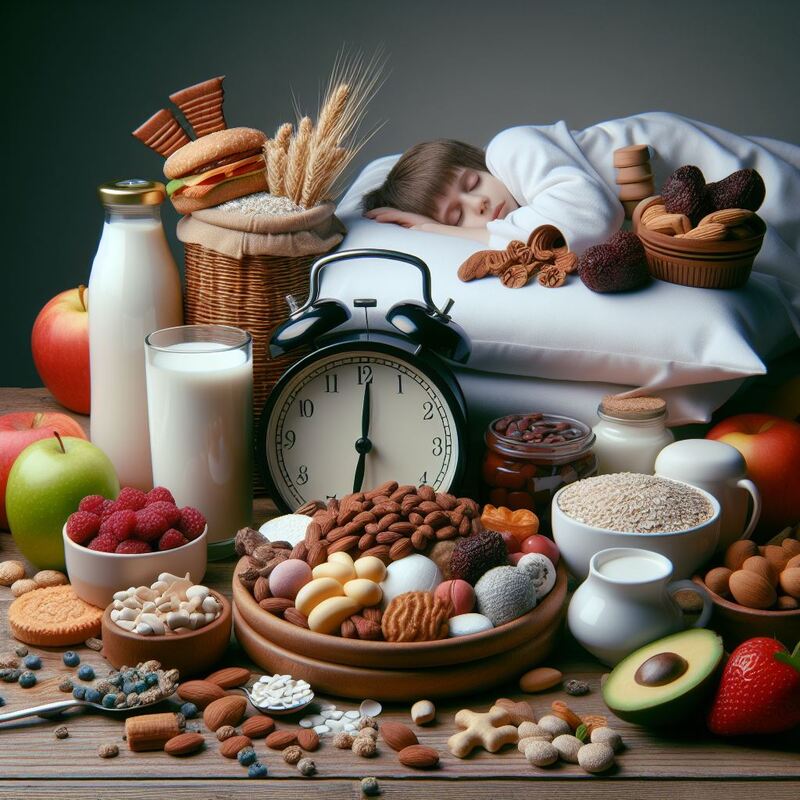The Impact of Diet and Nutrition on Sleep Quality
The Impact of Diet and Nutrition on Sleep Quality
The Impact of Diet and Nutrition on Sleep Quality
A good night’s sleep is crucial for overall health and well-being, but in our fast-paced, high-stress world, sleep disturbances are increasingly common. Among the various factors that influence sleep quality, diet and nutrition play a pivotal role. What we eat and drink can significantly affect how well we sleep, influencing the duration and quality of sleep we get each night. This article explores the intricate relationships between diet, nutrition, and sleep, offering insights into how dietary choices can either enhance or hinder sleep quality.
Understanding Sleep and Its Biological Importance
Sleep is a complex biological process that helps us recover from the physical and mental stresses of the day. Quality sleep is essential for various bodily functions, including cognitive performance, emotional regulation, and physical health. It is during sleep that the body repairs tissues, synthesizes proteins, and regulates hormones responsible for growth and appetite.
The Impact of Diet and Nutrition on Sleep Quality
How Diet Influences Sleep
The connection between diet and sleep is bidirectional; not only can sleep influence our dietary choices, but what we consume can significantly affect our sleep patterns and quality. Several dietary components have been identified that impact sleep, including macronutrients (carbohydrates, proteins, and fats), micronutrients (vitamins and minerals), and various beverages.
Macronutrients and Sleep
- Carbohydrates: The type and timing of carbohydrate consumption can affect sleep. High-glycemic index (GI) foods consumed at least four hours before bedtime have been associated with a significant reduction in sleep onset latency, meaning it can help you fall asleep faster. However, consuming sugary, refined carbs close to bedtime can lead to disrupted sleep patterns and decreased sleep quality.
- Proteins: Foods high in protein can improve sleep quality by providing the amino acid tryptophan, which the body converts into serotonin and melatonin, the hormones that regulate sleep. Studies suggest that diets higher in protein may promote better sleep quality and reduced wakefulness during the night.
The Impact of Diet and Nutrition on Sleep Quality
- Fats: The type of fat consumed can also impact sleep. High intake of saturated fat has been linked to lighter, less restorative sleep, whereas omega-3 fatty acids found in fish have been shown to increase the production of serotonin, potentially improving sleep quality.
Micronutrients and Their Effects
- Magnesium: This mineral plays a role in supporting deep, restorative sleep by maintaining healthy levels of GABA, a neurotransmitter that promotes sleep. Magnesium deficiency has been linked to restless sleep and frequent awakenings.
- Iron: Iron deficiency is one of the most common nutritional deficiencies globally and is associated with Restless Legs Syndrome (RLS), a condition that can severely disrupt sleep.
- Vitamins: Certain vitamins, such as B vitamins, are crucial for regulating tryptophan levels and the synthesis of melatonin. Vitamin D deficiency has also been linked to shorter sleep duration and poorer sleep quality.
The Impact of Diet and Nutrition on Sleep Quality
The Role of Beverages in Sleep
- Caffeine: As a stimulant, caffeine can delay the timing of the body clock, reduce total sleep time, and impair sleep quality. It blocks adenosine, a neurotransmitter that promotes sleep, and its effects can last several hours after consumption.
- Alcohol: While alcohol might help induce sleep initially, it significantly disrupts the sleep cycle, particularly during the second half of the night, reducing REM sleep and overall sleep quality.
- Herbal Teas: Beverages like chamomile tea and valerian root tea contain compounds that may help increase GABA levels, facilitating the onset of sleep and improving sleep quality.
Practical Dietary Tips for Better Sleep
The Impact of Diet and Nutrition on Sleep Quality
- Establish a Balanced Diet: Ensure a balanced intake of carbohydrates, proteins, and healthy fats. Focus on whole grains, lean proteins, and omega-3 fatty acids to enhance sleep quality.
- Mind the Timing: Avoid heavy meals and large amounts of liquids close to bedtime. Allow at least three hours between dinner and bedtime to prevent digestive issues that can disturb sleep.
- Limit Caffeine and Alcohol: Avoid caffeine at least six hours before bedtime, and minimize alcohol consumption, especially late in the evening.
- Incorporate Sleep-Promoting Foods: Include foods rich in magnesium, such as almonds and spinach, and those high in tryptophan, like turkey and yogurt, in your diet.
The Impact of Diet and Nutrition on Sleep Quality
Conclusion
The relationship between diet and sleep is an area of growing interest and research. What we eat can significantly affect how well we sleep, which in turn impacts our health, mood, and quality of life. By making informed dietary choices, individuals can enhance their sleep quality, contributing to better overall health and well-being. As research continues to unfold, it becomes increasingly clear that a holistic approach to diet and nutrition can serve as a powerful tool in improving sleep and maintaining optimal health.
